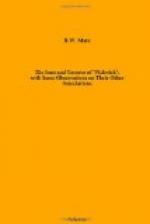One of Cruikshank’s pictures illustrates the above scene in the booking office, and in it one of the figures represents Dickens himself as he appeared at the period. Dotted about on the walls are bills in which the name of the hotel is very conspicuous.
In chapter two of The Pickwick Papers we get a further glimpse of the inn, centring in a more exhilarating and epoch-making incident. The Pickwickians were to start on their memorable peregrinations from the “Golden Cross” for Rochester by the famous “Commodore” coach; and Mr. Pickwick having hired a cabriolet in the neighbourhood of his lodgings in Goswell Street arrived at the hotel in order to meet his friends for the purpose. On alighting, and having tendered his fare, an animated incident with the cabman, who accused him of being an informer, ensued, and ended in the assault and battery described in the following words:
“The cabman dashed his hat upon the ground with a reckless disregard of his own private property, and knocked Mr. Pickwick’s spectacles off, and followed up the attack with a blow on Mr. Pickwick’s nose and another on Mr. Pickwick’s chest; and a third in Mr. Snodgrass’s eye; and a fourth, by way of variety, in Mr. Tupman’s waistcoat, and then danced into the road and then back again to the pavement, and finally dashed the whole temporary supply of breath out of Mr. Winkle’s body; and all in half a dozen seconds.”
The embarrassing situation was only saved by the intervention of Mr. Jingle, who quickly settled the cabman and escorted Mr. Pickwick into the travellers’ waiting-room and had a raw beefsteak applied to Mr. Pickwick’s eye, which had been badly mauled by the irate cabman. All things righted themselves, however, and the merry party left the “Golden Cross” on the coach for their journey to Rochester, to the accompaniment of Mr. Jingle’s staccato tones as they drove through the archway, warning the company to take care of their heads:
“’Terrible place—dangerous work—other day—five children—mother-tall lady, eating sandwiches-forgot the arch—crash—knock—children look round—mother’s head off—sandwich in her hand—no mouth to put it in—head of family off—shocking—shocking.’”
The arch referred to by our jesting friend can be seen in the picture here shown.
The “Golden Cross” also figures prominently in David Copperfield on the occasion of the arrival of the hero of the book from Canterbury:




